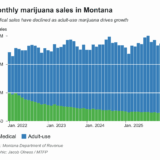German officials have released a report on the impact of the nation’s marijuana legalization law, finding that fears from opponents about youth use, traffic safety and more have so far proved largely unfounded. However, the illicit market has not meaningfully diminished under the limited legal regulatory model that has been rolled out in the country to date.
The interim report, which was required under the cannabis law enacted last year, assessed a series of health, public safety and economic factors associated with the end of prohibition.
Among the most notable findings in the document published on Monday is the fact that youth marijuana use has continued to decline, even after possession and home cultivation were legalized for adults and social clubs offering access to members opened.
Further, “no clear changes in the previous trend in cannabis consumption among adults could be observed,” the report, conducted on behalf of the federal Ministry of Health, says, according to a translation.
“The percentage increase in adults who have consumed cannabis in the last 12 months, which has been observed since approximately 2011, is likely to continue…without any drastic changes,” it says.
A separate recent study conducted by German federal health officials also found that rates of marijuana use declined among youth after the country legalized adult-use cannabis, contradicting one of the more common prohibitionist arguments against the reform.
Another finding of the new legalization evaluation concerns traffic safety, with researchers determining that there’s been no meaningful change in incidents on the roadways associated with the policy change.
“In the area of road safety, partial legalization has so far shown no significant changes in self-reported driving under the influence of cannabis or in the number of people killed or injured in road traffic,” the report states.
Early data on the impact of legalization on the illicit market indicates that the law has “not yet made a significant contribution to the displacement of the black market intended by the legislature,” the report found.
One reason for the continued presence of the illegal market could be related to how Germany’s legalization law is being rolled out, with a limited number of social clubs that grow cannabis for members to consume—but without a comprehensive commercial industry that could provide wider access to adults. And even if broad retail launches, it may take time to substantially transition consumers to the legal market, which has been the case in Canada and U.S. states that have enacted the reform.
For now, if Germany intends to substantially shift people to the legal market, “the framework for the approval and operation of cultivation associations must be simplified,” the report says.
It also advises that, based on current information, there’s not a need to change the possession limit of 25 grams.
“The first interim report published today confirms that the legalization of cannabis was the right and long overdue step,” MP Carmen Wegge of the Social Democratic Party (SPD) said.
“The independent evaluation shows no significant increase in cannabis consumption among adults and even a decrease among minors, no noticeable negative effects on the health of adults, and significantly fewer criminal proceedings,” she said. “But the core message is clear: Partial legalization protects health and improves the ability of the constitutional state to act.”
But Federal Health Minister Nina Warken, a member of the anti-legalization Christian Democratic Union, said the results so far show “worrying trends, despite the lack of further data in some areas.”
“We will have to discuss possible need for action together with the coalition parties and the security authorities,” she said.
Germany’s former health minister Karl Lauterbach, who spearheaded the government’s legalization plan, responded to the report, saying “cannabis consumption among young people continues to decline despite legalization.”
“That was to be expected; other countries are showing the same trend,” he said. “If one wants to combat the black market, cultivation clubs must not be further obstructed. Cannabis consumption is not a crime.”
Former MP Kristine Lütke, who was one of the most vocal champions of legalization, said the report shows “there is no urgent need for action.”
“Particularly encouraging: children and adolescents are not consuming cannabis more frequently than before partial legalization. The trend is rather declining,” she said.
A final report on the impact of legalization in Germany is expected in April 2028.
Germany’s legalization law took effect in April 2024, allowing adults to possess and grow certain amounts of cannabis and social clubs began to open, providing members with legal access to marijuana products.
Following a pivotal national election earlier this year, political parties that were cooperating to form a new coalition government announced that they would be conducting an “open-ended evaluation” of the country’s marijuana legalization law—meaning that at least for now, officials will allow the policy to stay in place.
—
Marijuana Moment is tracking hundreds of cannabis, psychedelics and drug policy bills in state legislatures and Congress this year. Patreon supporters pledging at least $25/month get access to our interactive maps, charts and hearing calendar so they don’t miss any developments.![]()
Learn more about our marijuana bill tracker and become a supporter on Patreon to get access.
—
In December, the federal minister for food and agriculture signed off on a plan to allow for research-focused commercial marijuana pilot programs to test legal and regulated access to cannabis for consumers.
At the local level, the city of Frankfurt late last year announced plans to move forward with a five-year pilot program that would make cannabis products available to adults more broadly , with the city of Hanford also pursuing a similar plan. A number of other localities have also expressed interest in conducting cannabis sales pilot projects.
Despite widespread concern that results of February’s election could spell doom for the legalization law, most Germans— 59 percent of eligible voters —support allowing adults to purchase cannabis from licensed stores.
For the previous three years Germans were polled on the issue, support sat at just under 50 percent. But as the country’s marijuana law began being implemented last year, there was a spike in favor of the policy change.
Notably, respondents who identified as CDU or CSU—two of the three coalition parties behind the new agreement—were the only political affiliations among which majorities of voters supported rolling back the reform law.
German officials last year convened an international conference where leaders were invited to share their experiences with legalizing and regulating marijuana , with a focus on public health and mitigating the illicit market.
Representatives from Luxembourg, Malta, the Netherlands, the Czech Republic and Switzerland were invited by German Commissioner for Addiction and Drug Issues Burkhard Blienert to the meeting in Berlin.
The countries that participated in the ministerial have varying cannabis policies. Malta, for example, became the first European country to enact cannabis legalization in 2021. Luxembourg followed suit, with the reform officially taking effect in 2023 .
Government officials from several countries, including the U.S., also met in Germany in 2023 to discuss international marijuana policy issues as the host nation worked to enact legalization.
A group of German lawmakers, as well as Blienert, separately visited the US and toured California cannabis businesses in 2022 to inform their country’s approach to legalization.
The visit came after top officials from Germany, Luxembourg, Malta and the Netherlands held their first-of-its-kind meeting to discuss plans and challenges associated with recreational marijuana legalization in 2022.
































